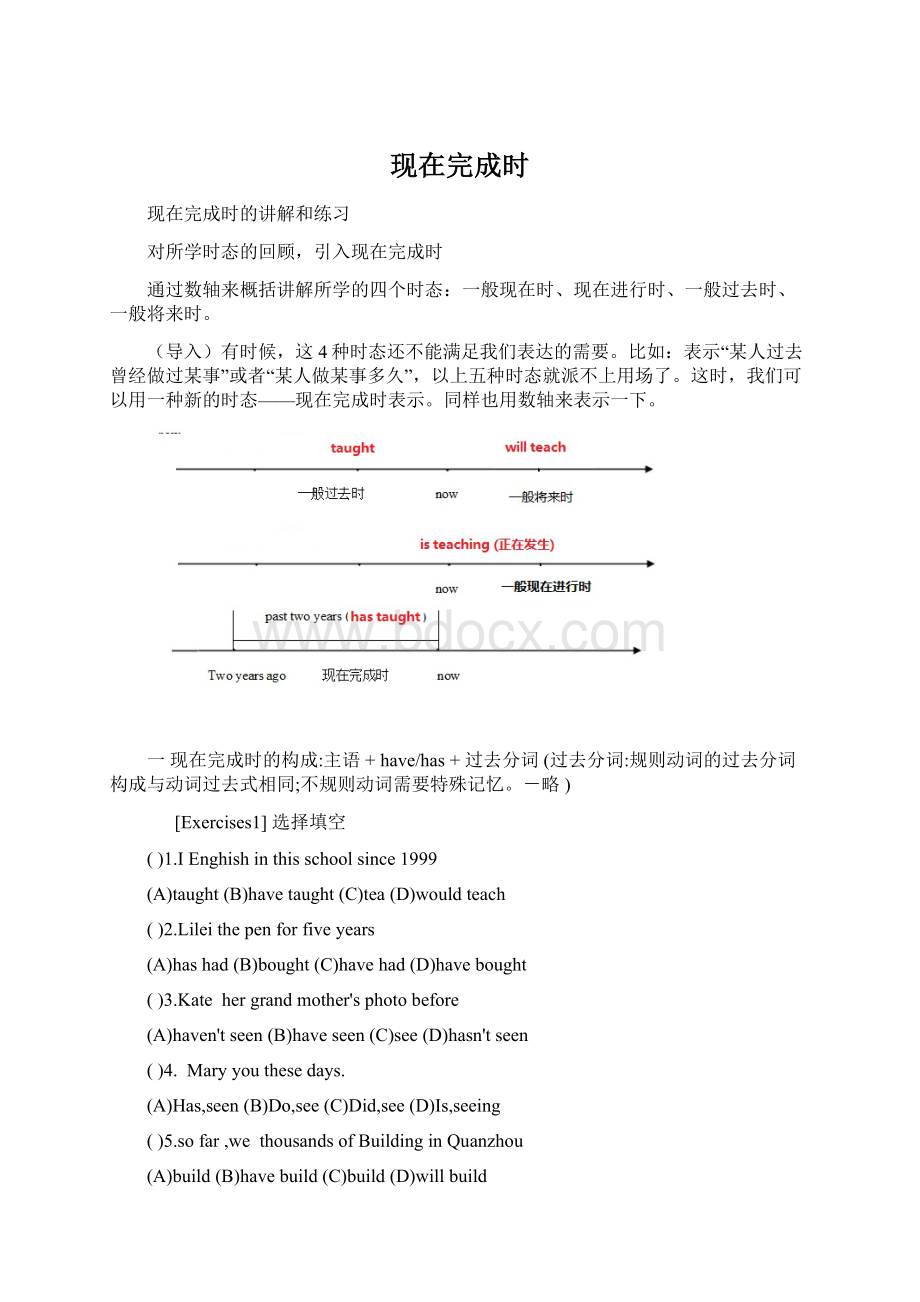现在完成时.docx
《现在完成时.docx》由会员分享,可在线阅读,更多相关《现在完成时.docx(14页珍藏版)》请在冰豆网上搜索。

现在完成时
现在完成时的讲解和练习
对所学时态的回顾,引入现在完成时
通过数轴来概括讲解所学的四个时态:
一般现在时、现在进行时、一般过去时、一般将来时。
(导入)有时候,这4种时态还不能满足我们表达的需要。
比如:
表示“某人过去曾经做过某事”或者“某人做某事多久”,以上五种时态就派不上用场了。
这时,我们可以用一种新的时态——现在完成时表示。
同样也用数轴来表示一下。
一现在完成时的构成:
主语+have/has+过去分词(过去分词:
规则动词的过去分词构成与动词过去式相同;不规则动词需要特殊记忆。
-略)
[Exercises1]选择填空
()1.IEnghishinthisschoolsince1999
(A)taught(B)havetaught(C)tea(D)wouldteach
()2.Lileithepenforfiveyears
(A)hashad(B)bought(C)havehad(D)havebought
()3.Katehergrandmother'sphotobefore
(A)haven'tseen(B)haveseen(C)see(D)hasn'tseen
()4.Maryyouthesedays.
(A)Has,seen(B)Do,see(C)Did,see(D)Is,seeing
()5.sofar,wethousandsofBuildinginQuanzhou
(A)build(B)havebuild(C)build(D)willbuild
二、基本结构:
助动词have/has+过去分词(done)
肯定句:
主语+have/has+过去分词(done)+其他
否定句:
主语+have/has+not+过去分词+其他.
一般疑问句:
Have/Has+主语+过去分词+其他?
Yes,主语+have/has.(肯定)No,主语+haven't/hasn't.(否定)
特殊疑问句:
特殊疑问词+have/has+主语+过去分词+其他?
三、现在完成时的用法1:
表示过去发生或已经完成的某一动作对现在造成的影响或结果。
此时,常与时间副词already(已经),yet(还、已经),just(刚刚、仅仅),ever(曾经),never(从不),before(以前)等连用。
这几个副词的用法如下:
1.already意为“已经”,通常用于肯定句中,可放在助动词之后,过去分词之前,也可以放在句末。
实例:
1)I'vealreadyreadthisbook.我已经读过这本书了。
(“读”这一动作发生在过去,对现在造成的影响是“知道书中的内容”。
)
2)I'vewashedmyclothesalready.我已经洗了衣服。
(洗衣服的动作已完成,其结果是“衣服冼干净了”。
)
注意:
在表示吃惊或明知故问等感情色彩时,already也可用于(口语)疑问句中。
实例:
3)Haveyoumethimalready?
你(真的)已经见过他了?
2.yet用在疑问句中意为“已经”,用在否定句中意为“还”,常放在句末。
实例:
1)—Hashefoundhiswatchyet?
他已经找到他的手表了吗?
—No,notyet.不,还没有。
2)Thewomanhasn'tfoundherdogyet.
那位妇女还没有找到她的狗。
(没找到狗,心里着急,这就是对现在的影响)
3.just意为“刚刚”,表示行为刚刚过去,常放在助动词与过去分词之间。
实例:
Hehasjustcomebackfromschool.他刚从学校回来。
4.ever意为“曾经”,用于疑问句或否定句中,放在助动词与过去分词之间。
实例:
1)HaveyoueverbeentoHongKong?
你曾去过香港吗?
2)Ihaven'teverspokentoher.我未曾和她说过话。
5.never意为“从来没有”常与before连用(before要放在句尾,而never多放在助动词与过去分词之间。
实例:
Ihavenevertravelledbyplanebefore.我以前从来没有乘飞机旅行过。
6.before意为“以前”,指过去不确定的某个时间,总是放在句末,不受句型的限制。
1)HaveyoubeentoHainanbefore?
你以前去过海南吗?
2)Ihaven'teatenGuangdongfoodbefore.我以前没吃过广东菜。
现在完成时用法二2——持续性用法(肯定句,疑问句中谓语动词必须是延续性动词):
表示过去已经开始,持续到现在的动作或状态。
此时常与“for+一段时间或“since+过去的点时间或从句(从句用一般过去时)以及sofar(到目前为止)等时间状语连用。
sofar=uptonow,bynow(到如今,迄今为止),inthepast/lastfewyears,(过去几年来),thesedays(这几天),since/eversince(自从,从那时起)for+时间段
综合练习:
I.用never,ever,already,yet,for,since填空
1. Ihave_______seenhimbefore,soIhavenoideaabouthim.
2. Jackhas_________finishedhishomework________anhourago.
3. Mr.Wanghastaughtinthisschool________tenyears.
4. “Haveyou________seenthefilm?
”“No,Ihave________seenit.”
5. “Hasthebusleft_______?
”“Yes,ithas_________left.”
II.翻译下列句子:
1. 他们已经打扫了教室吗?
2. 我们已经认识有二十年了。
3. 打那以后,她一直住在这。
4. “你曾经到过那里吗?
”“不,我从来没到过那里。
”
III.用适当的时态填空:
1.She’s_____________(live)hereeversinceshewasten.
2.Bothofthem________________(be)inHongkongfortendays.
3.Bothofthem________________(come)toHongkongtendaysago.
4.Halfanhour__________(pass)sincethetrain__________(leave).
5.Mary________(lose)herpen.____________you______________(see)ithereandthere?
6._____________you____________(find)yourwatchyet?
7.---Areyouthirsty?
---NoI_________just_____________(have)someorange.
8.We_____________already______________(return)thebook.
9.___________they____________(build)anewschoolinthevillage?
10.I________________(notfinish)myhomework.Canyouhelpme?
11.Myfather_____(read)thenoveltwice.
12.I_________(buy)abookjustnow.
13.I_________(lost)mywatchyesterday.
14.Myfather___________(read)thisbooksinceyesterday.
III.句型转换:
1.Hehasalreadygonehome.
He___________________home____________.(否定句)
____________he__________home___________?
(疑问句)
2.Hehaslunchathome.
He_______________________lunchathome.(否定句)
____________he__________lunchathome?
(疑问句)
3.Hehasbeentheretwice.
______________________________________hebeenthere?
(划线提问)
4.Ihavelunchatschool.
____________________you____________lunch.(划线提问
四.Since和for的用法
表示过去已经开始持续到现在的动作或状态常用的时间状语有:
for,since,howlong,sofar,thesedays等。
Since+过去点的时间,for+一段时间(数词+量词),此划线部分用howlong提问。
一、since短语或从句表示过去的动作延续至今,since之后的时间为一点。
如:
Mr.Smithhasworkedheresince1984.1984年以来,史密斯先生一直在这工作。
He’slearnedabout5,000Englishwordssincehewenttocollege.他上大学以来大约学了五千个英语单词。
二、for短语表示动作延续多长时间,for的宾语为时间段。
如:
Wehaveknowneachotherfortwentyyears.我们认识有二十年了。
Ihaven’tseenherforalongtime.我好久没有见到她了。
练习:
用since和for填空
1)______twoyears2)_______twoyearsago3)_______lastmonth
4)______19995)_______yesterday6)_______4o’clock
7)______4hours8)_______anhourago9)_______wewerechildren
10)_____lunchtime11)______shelefthere
1.HehaslivedinNanjing________theyearbeforelast.
2.I’veknownhim__________wewerechildren.
3.OurteacherhasstudiedJapanese_________threeyears.
4.Shehasbeenawayfromthecity___________abouttenyears.
5.It’sabouttenyears__________sheleftthecity.
三、部分短暂性动词与之对应的延续性动词:
短暂性动词
延续性动词
die
bedead
borrow
keep
buy/catch
have
getup
beup
come
behere
go
bethere
finish
beover
leave
beaway
open
beopen
close
beclosed
begin/start
beon
becomeinterestedin
beinterestedin
wakeup
beawake
puton
wear
fallasleep
beasleep
join
bein
arrive/reach
be
短暂性转换延续性
①arriveat/insw.getto/reachsw.come/go/movetosw.
→beinsw./atschool/athome/onthefarm/behere/bethere
1) HegottoBeijingfiveminutesago.
He__________________________Beijingfor__________________.
2) ImovedtotheUSAlastyear.
I__________________________theUSAsince____________________.
3) Iwenthomeyesterday.
I________________________homefor___________________.
4) Theycameherelastweek.
They__________________heresince___________________.
②come/goback,return→bebackcome/goout→beout
1)Hecameouttwoyearsago.
He____________________________for____________________.
2) WereturntoFuzhouyesterday.
We_________________________toFuzhousince__________.
③become→be
1) Ibecameateacherin2000.
I__________________ateacherfor__________________.
2) Theriverbecamedirtylastyear.
Theriver__________________dirtyfor___________________.
④close→beclosedopen→beopen
1) Theshopclosedtwohoursago.
Theshop__________________________for__________________.
2) Thedooropenedatsixinthemorning.
Thedoor________________________forsixhours.
⑤getup→beupdie→bedead
leavesw.→beawayfromsw.
fallasleep/gettosleep→beasleep
finish/end→beovermarry→bemarried
1) Igotuptwohoursago.
I________________________since________________.
2) HeleftFuzhoujustnow.
He________________________________Fuzhouforfiveminutes.
3) Mygrandpadiedin2002.
Mygrandpa______________________for_______________.
4) Themeetingfinishedatsix.
Themeeting____________________forsixhours.
5) Igottosleeptwohoursago.
I__________________________since___________________.
6) Theymarriedin1990.
They___________________________since_________.
⑥start/begintodosth.→dosth.begin→beon
1) Ibegantoteachatthisschoolin1995.
I________atthisschoolsince____.
2) Thefilmbegantwominutesago.
Thefilm____________for________.
⑦borrow→keeplose→nothavebuy→haveputon→wear
catch/getacold→haveacoldgettoknow→know
1) Theyborroweditlastweek.
They__________________itsince____________________.
2) Iboughtapentwohoursago.
I__________________apenfor__________________.
3) Igottoknowhimlastyear.
I___________________himsince____________________.
4) Iputonmyglassesthreeyearsago.
I____________________myglassesfor__________________.
⑧have/hasgoneto→havebeenin
1) HehasgonetoBeijing.
He_____________Beijingfortwodays.
⑨jointheleague/theParty/thearmy
→bealeague/aPartymember/asoldier
→beamemberoftheleague/theParty
→beintheleague/theParty/thearmy
1) Hejoinedtheleaguein2002.
He_________________a__________________fortwoyears.
He__________________a_____________________the__________fortwoyears.
He__________________________________theleaguefortwoyears.
2) Mybrotherjoinedthearmytwoyearsago.
Mybrother____________________a___________for______________________.
Mybrother______________________in_______________________fortwoyears.
选择填空
()1.—HowlongcanIthisbook?
—Twoweeks
(A)borrow(B)keep(C)lend(D)return
()2.Herfatherin1990andherhusbandformorethanfiveyears
(A)died,dead(B)hasdied,dead(C)died,hasbeendead(D)hasdied,hasdied
()3.Ihavethisnicewatchfortwoyears
(A)had(B)bought(C)borrowed(D)lend
()4.Hehishomefortenyears
(A)hasleft(B)leftfrom(C)hasbeenawayfrom(D)wasawayfrom
()5.Healeaguememberforthreeyears
(A)is(B)hasbeen(C)hasbecome(D)havebecome
()6.Lihua'sbrotherhasfortwoyears
(A)joinedthearmy(B)beenanarmy
(C)becomeasoldier(D)beeninthearmy
()7.Hehasn'tQuanzhoueversinceheleftschool
(A)left(B)beenaway(C)been(D)away
五、havebeenin,havebeento与havegoneto的用法
一、have(has)beenin表示“在某地呆多长时间”,常与表示一段时间的状语连用,如:
since,for,howlong等。
例如:
Mr.BrownhasbeeninShanghaiforthreedays.布朗先生来上海已经有三天了。
此外还有这些搭配:
havebeenhere(there)/athome(school)/onthefarm
havebeenhere(there)/abroad
二、have(has)beento表示“曾经去过某地”,现在已经不在那里了。
可与just,ever,never等连用,例如:
Ihavejustbeentothepostoffice.我刚才去邮局了。
MaryhasneverbeentotheGreatWall.玛丽从未去过长城。
HaveyoueverbeentoHangzhou?
你曾经去过杭州